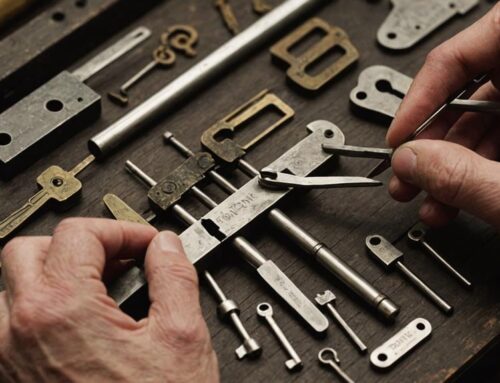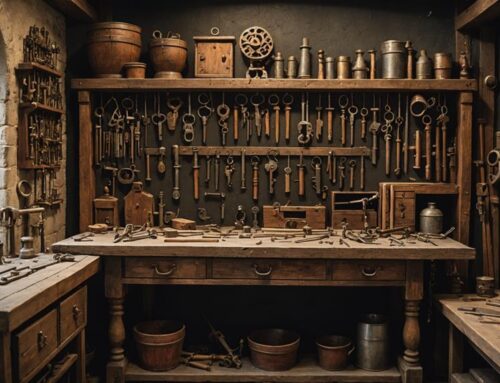As you explore the hobby of lock picking, understanding the laws is essential. Possessing lock picking tools is legal with valid reasons, but always seek permission before picking a lock. Respect property rights to stay on the right side of the law and ethics—property damage is a big no. Proper training sharpens your skills and ethical compass. Lock picking competitions can showcase your abilities, while reporting security flaws helps improve standards. Keep in mind that transparency and adherence to guidelines enhance your reputation in the community. More insights await you in the complexities of lock picking ethics and practices.
Key Takeaways
- Obtain explicit permission before practicing lock picking to stay within legal and ethical boundaries.
- Adhere to local laws and regulations concerning possession and use of lock picking tools.
- Respect property rights by avoiding damage and only practicing on owned or permitted locks.
- Prioritize continuous education on ethical implications to make informed decisions.
- Maintain transparency and communication with property owners to ensure ethical lock picking practices.
Understanding Lock Picking Laws

If you're considering delving into the world of lock picking, it's vital to first grasp the legal landscape surrounding this skill. Legal lock picking practices are governed by laws that vary from state to state and country to country.
In the United States, it's important to understand that the laws surrounding lock picking can be complex and can differ considerably depending on your location. Many jurisdictions also have specific regulations regarding the sale and possession of lock picking tools, so it's wise to consult local laws or resources for understanding the legal side.
In general, possessing lock picking tools is legal in most places, as long as you have a lawful reason for owning them, such as being a locksmith or a hobbyist practicing on your own locks.
However, using lock picking tools on someone else's property without permission is illegal and can result in severe consequences.
It is important to research and understand the specific laws in your area regarding lock picking to guarantee that you're practicing this skill legally and ethically.
Obtaining Proper Training
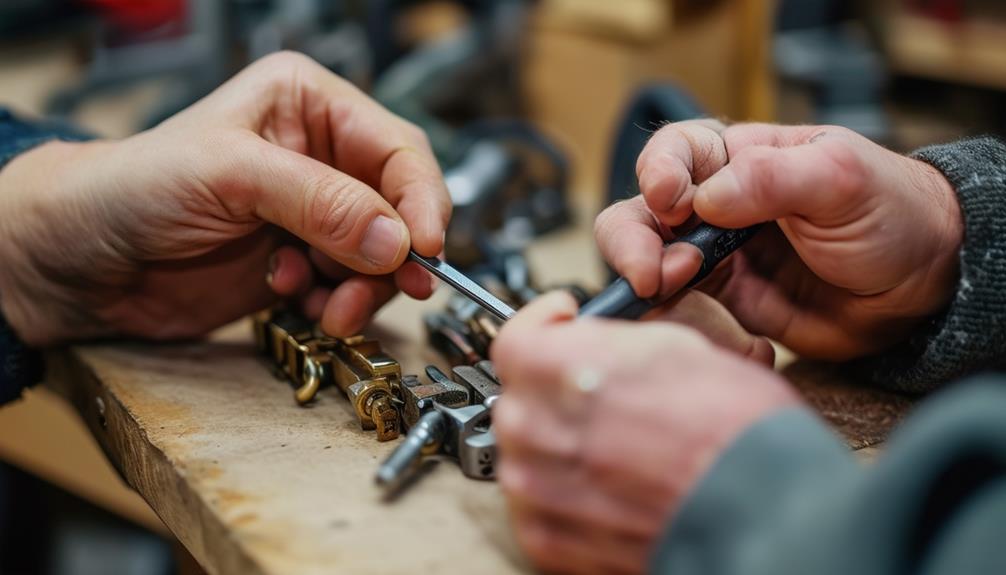
If you're looking to enhance your lock picking skills, consider enrolling in training programs that offer hands-on experience and expert guidance.
These programs can provide you with the practical experience needed to understand the intricacies of lock mechanisms and develop your proficiency, including insights into the mechanics of pin tumbler locks.
Training Programs
Interested in becoming proficient in lock picking? Training programs can provide you with the necessary knowledge and skills to excel in this hobby.
Here are some key points to evaluate when exploring training programs:
- Online Courses: Look for reputable online platforms that offer extensive lock picking courses you can complete at your own pace.
- Local Workshops: Attend hands-on workshops in your area where experienced locksmiths or hobbyists can guide you through practical exercises.
- Locksmith Schools: Think about enrolling in locksmith schools that provide formal training in lock picking techniques and tools.
- Specialized Seminars: Attend specialized seminars or conferences focused on lock picking to learn from industry experts and enthusiasts.
- Apprenticeships: Seek out opportunities to apprentice under a skilled locksmith to gain practical experience and insights into the profession.
Practical Experience
When seeking practical experience in lock picking, obtaining proper training is key to honing your skills effectively. Training not only enhances your technical abilities but also instills vital knowledge about lock picking ethics.
Look for reputable organizations or experienced professionals who offer hands-on workshops or courses. These programs can provide you with structured learning, feedback on your technique, and guidance on maneuvering legal and ethical considerations.
Engaging in practical exercises under the supervision of a qualified instructor allows you to practice different methods of lock picking while understanding the ethical implications of this skill. By gaining firsthand experience in a controlled environment, you can develop your proficiency and decision-making abilities.
Remember that responsible lock picking involves respecting others' property and only using these skills for lawful purposes.
Incorporating practical experience into your training regimen will enhance your understanding of lock mechanisms and improve your proficiency in manipulating them.
Embrace opportunities to practice under supervision and seek feedback to refine your techniques and uphold ethical standards in the area of lock picking.
Respecting Property Rights
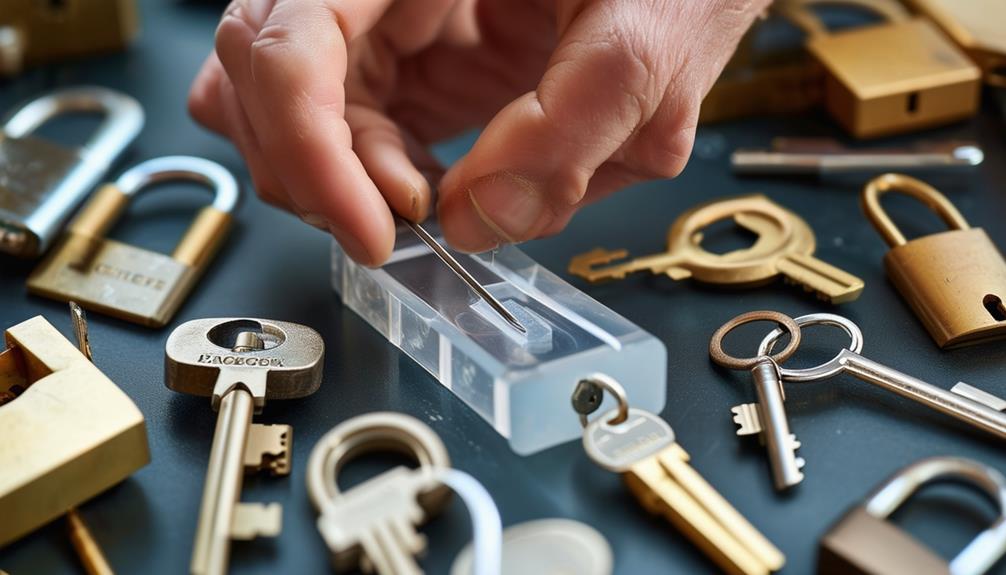
When engaging in lock picking as a hobby, it's essential to respect property rights. This includes understanding the legal implications of your activities and recognizing that unauthorized access can lead to serious consequences.
Obtaining proper permissions for lock picking activities and maintaining ethical standards when accessing properties are key aspects to take into account. By being mindful of these principles, you can guarantee that your hobby remains both lawful and ethical while also reflecting ethical considerations in your practices.
Property Ownership Boundaries
Respecting property rights is a fundamental aspect of engaging in the hobby of lock picking. When practicing legal lockpicking tips, it's vital to be mindful of property ownership boundaries.
Here are some key points to take into account:
- Always obtain permission: Before attempting to pick a lock, make certain you have explicit permission from the owner of the property or the lock itself.
- Respect private property: Avoid picking locks on properties where you don't have authorization, as it could lead to legal consequences.
- Do not damage locks: When practicing your skills, be careful not to damage the locks you're working on, as this could result in costly repairs for the property owner.
- Keep it legal: Stick to practicing on locks that you own or where you have received permission to pick, staying within the boundaries of the law.
- Maintain ethical standards: Upholding ethical standards in your hobby means respecting property rights and using your skills responsibly.
Lock Picking Permissions
To engage in the hobby of lock picking while respecting property rights, it's vital to prioritize obtaining proper permissions before attempting to pick any locks.
Lock picking permissions are essential as they guarantee that you're legally allowed to practice your hobby without infringing on someone else's rights. Before picking a lock, always seek permission from the owner of the property or the person responsible for the lock. This step not only demonstrates respect for property rights but also helps you avoid any potential legal consequences.
Remember that unauthorized lock picking is considered trespassing and can lead to serious legal trouble.
When requesting lock picking permissions, be transparent about your intentions and explain that you're practicing lock picking as a hobby. Some property owners may be more receptive if they understand your motives and assure them that you'll handle their property with care.
Always have a conversation with the property owner to establish clear boundaries and expectations regarding the lock picking activity. By obtaining proper permissions, you can enjoy your hobby ethically while respecting property rights.
Ethical Property Access
Prioritizing ethical property access is fundamental in the practice of lock picking. When engaging in this hobby, it's essential to uphold ethical considerations to guarantee you respect property rights and maintain a positive reputation within the lock picking community.
Here are some key points to keep in mind:
- Legal Boundaries: Always stay within the legal boundaries of lock picking. Make sure you're aware of local laws and regulations regarding the practice.
- Permission: Only pick locks that you have explicit permission to practice on. Avoid picking locks that you don't own or have been given authorization to access.
- No Harm: Ensure that your lock picking activities don't cause any damage to the property or the lock itself.
- Professionalism: Conduct yourself in a professional manner when practicing lock picking, and always prioritize respecting the property and the privacy of others.
- Education: Continuously educate yourself on the ethical considerations in lock picking to make informed decisions and contribute positively to the community.
Lock Picking for Educational Purposes
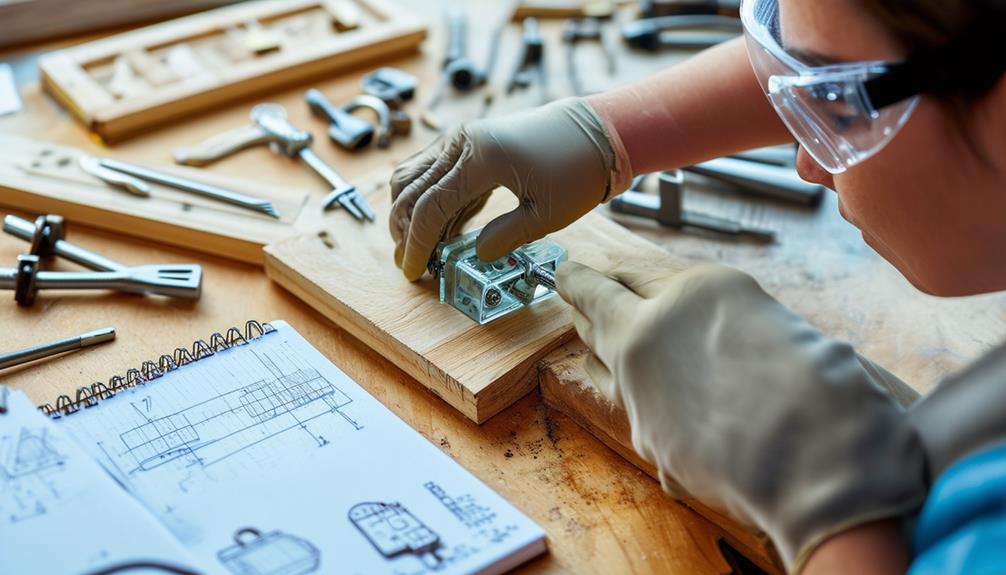
Exploring lock picking for educational purposes can provide valuable insight into the mechanics of locks and security systems. Understanding the inner workings of locks can enhance your knowledge of security measures and help you appreciate the importance of robust locking mechanisms.
As you investigate this practice, it's vital to follow guidelines for practicing ethical lock picking, focusing on safe and legal techniques for both hobbyists and professionals mastering ethical techniques.
When engaging in lock picking for educational purposes, it's important to abide by lock picking hobby laws to guarantee you're practicing legally and ethically.
By honing your skills through educational lock picking, you can develop a deeper understanding of how different types of locks function, which can be beneficial for locksmiths, security professionals, or even enthusiasts looking to expand their knowledge.
Through this educational journey, you can learn about the vulnerabilities of various locks and how they can be improved to enhance security measures.
Disclosure and Permission
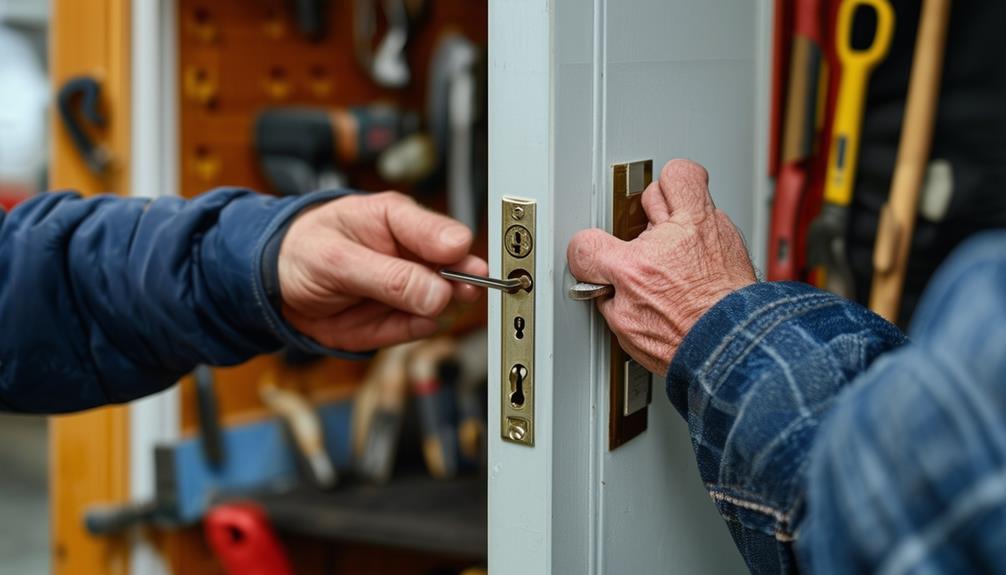
As you progress in your exploration of lock picking for educational purposes, it becomes imperative to address the aspect of disclosure and permission. Understanding the varying lock picking laws across the U.S. can greatly assist you in traversing the legal landscape.
- Inform Property Owners: Before practicing lock picking on any locks, always inform the owners of the property and seek their explicit permission.
- Be Transparent: Clearly communicate your intentions when discussing lock picking with others to maintain transparency.
- Respect Boundaries: Respect any restrictions or guidelines set by property owners regarding where and when you can practice lock picking.
- Keep Records: Maintain a record of permissions granted by property owners to guarantee you're always in compliance with legal and ethical standards.
- Educate Others: Take the opportunity to educate others about the legal and ethical aspects of lock picking, promoting responsible practices within the community.
Lock Picking Competitions
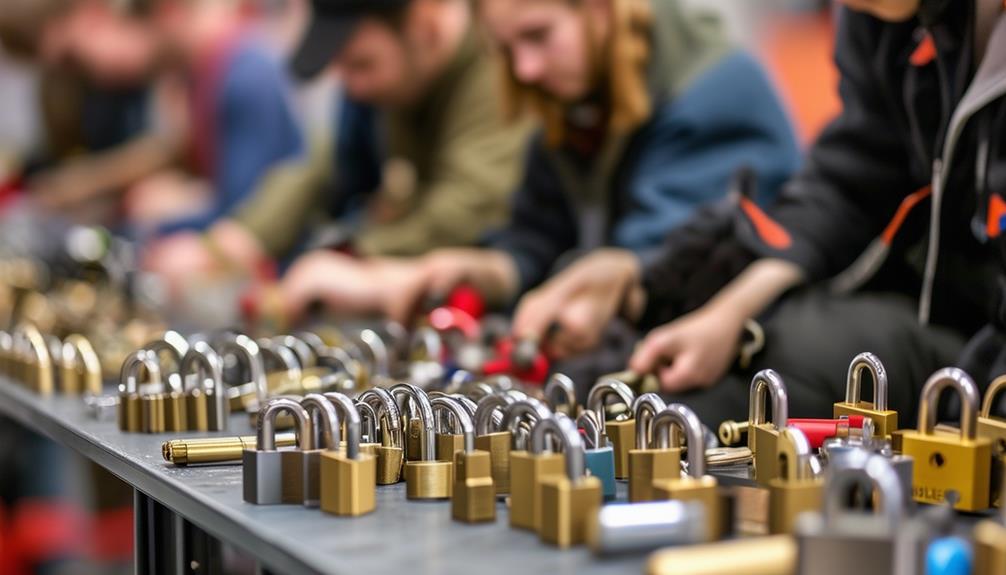
Interested in putting your lock picking skills to the test in a competitive setting? Lock picking competitions provide a thrilling platform for enthusiasts to showcase their expertise in a fun and challenging environment.
These events often feature a variety of locks with different levels of complexity, allowing participants to demonstrate their proficiency across various types of mechanisms. Competitors are typically judged based on speed, accuracy, and technique, making it a true test of skill and precision.
Many competitions also adhere to specific rules and guidelines that can help competitors prepare effectively.
Participating in lock picking competitions not only offers a chance to engage with like-minded individuals but also presents an opportunity to learn from others and enhance your own abilities.
These events can be a great way to improve your dexterity and problem-solving skills while enjoying the camaraderie of fellow hobbyists.
Whether you're a seasoned lock picking aficionado or a newcomer looking to expand your skills, entering a lock picking competition can be a rewarding experience that adds an exciting dimension to your hobby.
Reporting Security Vulnerabilities
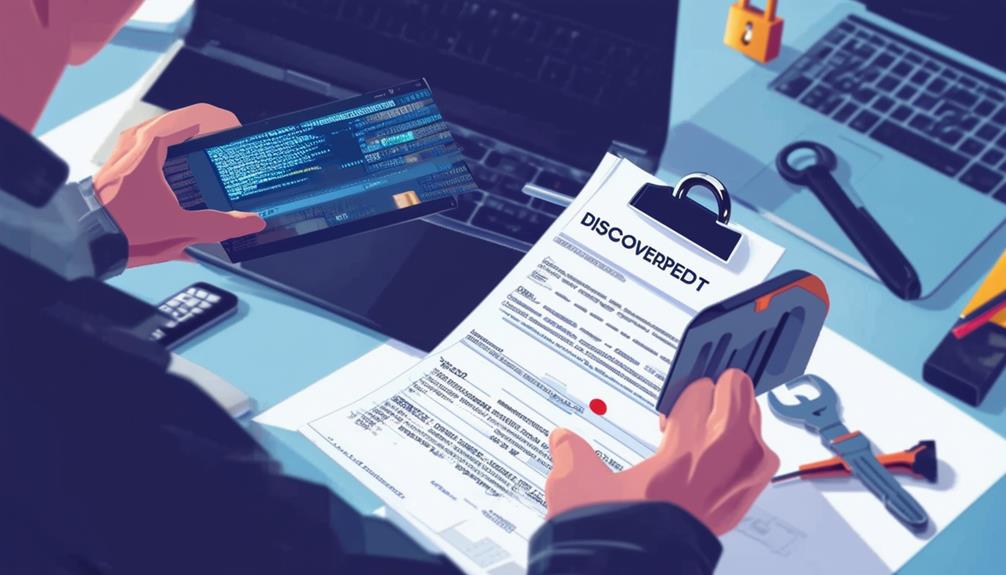
When identifying security vulnerabilities in locks or related systems, promptly reporting them to the appropriate authorities is crucial to guarantee timely mitigation and protection against potential threats.
Understanding the role of lock picking in security testing can provide valuable insights into the types of vulnerabilities that may exist, and how they can be addressed effectively the role of lock picking.
Reporting security vulnerabilities guarantees that necessary actions are taken to address weaknesses and enhance overall security measures.
Here are some key points to contemplate when reporting security vulnerabilities:
- Document the Vulnerability: Take detailed notes on how the vulnerability was discovered and its potential impact.
- Contact the Manufacturer: Inform the lock manufacturer directly about the security flaw to give them the opportunity to rectify the issue.
- Notify Relevant Authorities: Report the vulnerability to relevant security organizations or government agencies responsible for overseeing lock standards.
- Avoid Unauthorized Disclosure: Refrain from sharing details of the vulnerability publicly until it has been addressed to prevent exploitation.
- Follow Responsible Disclosure Practices: Adhere to responsible disclosure guidelines to guarantee that the vulnerability is resolved while minimizing the risk of exploitation.
Lock Picking Ethics and Community
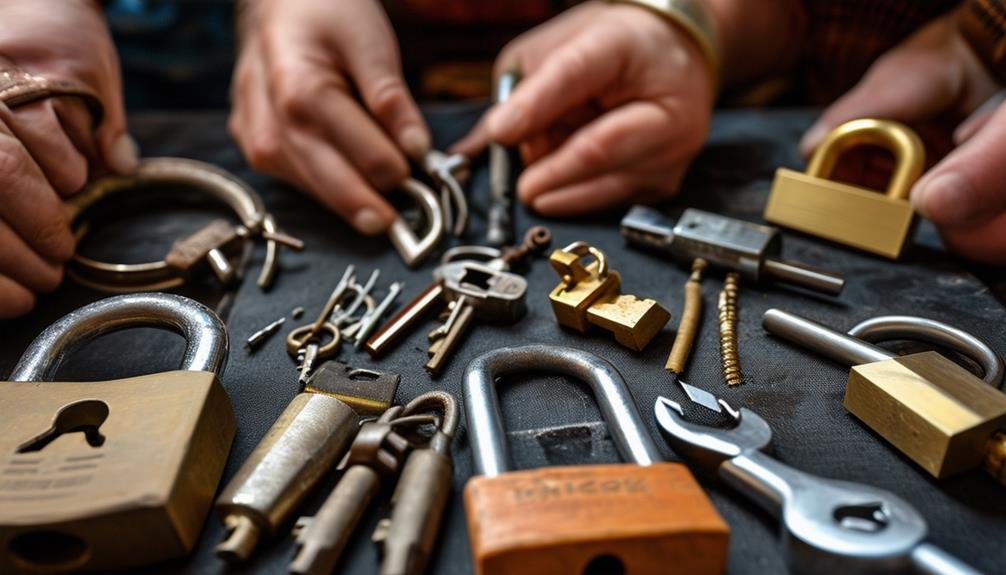
When engaging in lock picking activities, it is imperative to contemplate the ethical aspects of this practice and be mindful of the broader lock picking community. Lock picking ethics revolve around the responsible and legal use of lock picking skills. It is essential to always obtain explicit permission before attempting to pick a lock, ensuring that you are not violating anyone's privacy or property rights.
| Ethical Principle | Explanation |
|---|---|
| Obtain Permission | Always seek authorization before picking any lock. |
| Respect Privacy | Avoid picking locks on private property without consent. |
| Follow Laws | Adhere to all relevant laws and regulations regarding lock picking. |
Being a part of the lock picking community means upholding the highest ethical standards. By practicing ethical lock picking, you contribute to a positive reputation for this hobby and help foster a supportive and respectful environment for all enthusiasts. Remember, responsible lock picking not only aligns with legal requirements but also maintains the integrity of the lock picking community.
Frequently Asked Questions
Can Lock Picking Skills Be Used for Emergency Situations?
Yes, lock picking skills can indeed be beneficial in emergency situations.
In certain scenarios, like being locked out of your house or car with no other means of entry, knowing how to pick a lock can be a lifesaver.
Remember, it's essential to only use these skills in legal and ethical ways to avoid trouble.
With the right training and mindset, you can turn lock picking into a valuable emergency tool.
Is It Legal to Pick Locks on My Own Property?
You might think it's a no-brainer, but here's the twist: Yes, it's legal to pick locks on your own property.
As the owner, you have the right to access your own locks. However, be aware of any local laws or regulations that might restrict this practice.
Always guarantee you're acting within the boundaries of the law to avoid any unexpected consequences.
Happy lock picking on your own turf!
How Can I Ensure I Am Not Breaking Any Laws?
To guarantee you're not breaking any laws, research lock picking regulations in your area.
Familiarize yourself with the laws surrounding lock picking activities. Always obtain permission before practicing on someone else's property.
Stay informed on any updates or changes to lock picking laws. Being knowledgeable and respectful of legal boundaries will help you enjoy your hobby without any legal issues.
Are There Any Online Communities for Lock Picking Enthusiasts?
Yes, there are online communities for lock picking enthusiasts.
These platforms offer a space to share tips, techniques, and experiences with like-minded individuals. You can connect with others who share your passion for lock picking and learn from their expertise.
Engaging in these communities can help you improve your skills and expand your knowledge in the fascinating world of lock picking.
Can Lock Picking Be a Career Path in the Security Industry?
Lock picking can indeed become a viable career path in the security industry.
It offers opportunities in areas like locksmithing, physical security consulting, and even ethical hacking.
By mastering this skill, you can enhance your knowledge of security systems and potentially work in roles that focus on testing and improving security measures.
Pursuing certifications and gaining experience can help you establish yourself as a professional in the field.
Conclusion
Lock picking can be a fascinating hobby, but it's important to always remember the legal and ethical guidelines. By obtaining proper training, respecting property rights, and participating in lock picking competitions, you can enjoy this craft responsibly. Remember, like a key turning in a lock, your actions should be precise and deliberate. So immerse yourself in the world of lock picking with caution, respect, and a commitment to ethical practices. Happy picking!



